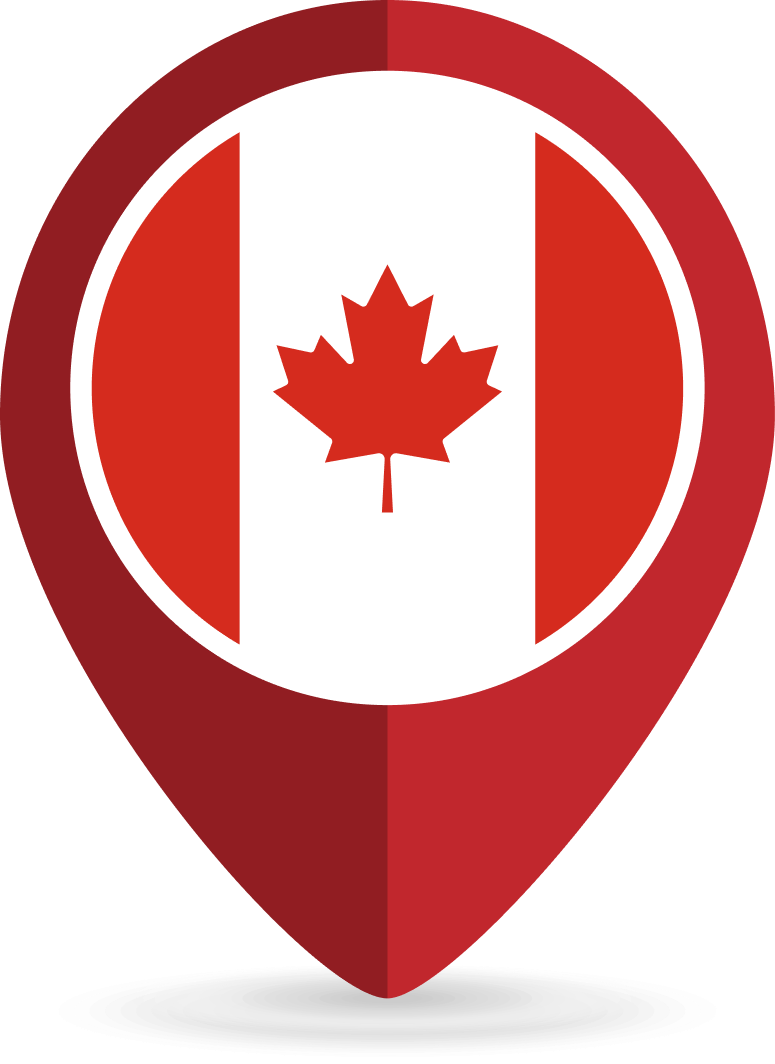Cost of Living in Canada
The cost of living in Canada is increasing due to inflation. It’s important to weigh the cost of living in various cities and regions against the average and median income in those areas. The cost of living relative to income is an essential consideration because it can have a long-term impact on one’s financial well-being. A person’s net worth will grow more slowly in response to a higher cost of living because they will be unable to save as much of their income. In calculating your expenses of living, you can factor in the following essentials:
- Housing
- Food & Groceries
- Transportation
- Childcare
Rent, utility, and telecom service prices all play a role in a home’s total monthly cost, and they all change from province to province. The sort of rental property you choose can also affect your monthly rent. We’ll be discussing the following varieties of dwellings throughout this guide:
- Bachelor style apartments designed for 1 person
- 2 bedroom apartments designed for 2 people
- 3 bedroom apartments designed for a small family of 3 or 4
- Single family detached houses designed for 4 or more people
For food and grocery costs, this includes the average amount of money needed to feed you and your family, including food from restaurants.
For transportation costs, since gas and insurance are the most variable between provinces, this part will include different gas prices and insurance premiums for each city, along with the cost of maintenance.
Finally, for childcare, it includes the cost of care for infants ages 0-2, toddlers ages 2-3, and preschoolers ages 3-4.
In order to get a better idea of what these prices might be in some of Canada’s major cities, we’ve put together this guide.
An Overview of Cost of Living Expenses in Canada for International Students
Moving to Canada as an international student can be a great opportunity to further your education, but it’s important to consider the cost of living expenses when budgeting for your stay.
As the cost of living in Canada per month varies depending on where one chooses to live and study, prospective international students should factor in their estimated expenses for all areas before arriving in Canada. Researching the average cost of living in each city will help them make an informed decision about their preferred choice of destination.
Additionally, international students may be eligible for certain discounts and subsidies, depending on their specific program and university. It’s important to research these discounts beforehand to ensure you are taking full advantage of them while studying abroad in Canada. This can significantly reduce their monthly expenses in Canada.
International Students Tuition Fees in Canada
Primary and secondary school costs
International students must pay annual tuition fees at elementary and high schools in Canada. There are different fees at different types of schools. For example:
- Public schools can range from $9,500 to $17,000 per year
- Private or independent day schools can range from $15,000 to $30,000 per year
- Private or independent boarding schools can range from $63,000 to $83,000 per year
Schools may also charge small fees for activities, such as:
- Sports teams
- Clubs
- Field trips
Most students bring their own lunch to school. Some schools offer cafeterias or hot lunch programs where a student may purchase a meal.
For more details about studying in the Canadian province you’re interested in, please visit:
- Canadian Association of Public Schools – International (CAPS-I)
- Canadian Accredited Independent Schools (CAIS)
Language school costs
Language school courses are often based on a certain number of weeks. The cost of tuition varies by school. Typically, tuition costs can range from $340 to $425 per week.
College and vocational school costs
Tuition fees for colleges and vocational schools vary depending on the program and school you choose. College programs vary in length. Some programs may only take a few months or others a few years. Typically, tuition can range from approximately $7,000 to $22,000 per year.
Many college programs also include a work placement or apprenticeship, so you may earn an income while you study.
On average, living costs are around $15,000 per year for college students (Universities Canada, 2019).
Find a college program and calculate what it will cost:
Tuition fees for universities vary depending on the program and school you choose. On average in Canada, university tuition costs around:
- $6,800 per year for international undergraduate students (Statistics Canada, 2022)
- $21,100 per year for international graduate students (Statistics Canada, 2022)
On average, living costs are around $15,000 per year for university students (Universities Canada, 2019).
Scholarships to Study in Canada
You may be eligible for a scholarship, fellowship or grant to study in Canada. The Government of Canada, our provinces and territories and many educational institutions offer funding for international students.
Many colleges and universities also offer scholarships. For more information, please contact your institution directly.
Discounts for Students
Many airlines, bus companies and trains in Canada offer discounts to students. Find out about the international student identity card from the Canadian Federation of Students.
Cost of Living in Canada Per Month for a Single Student
The cost of living in Canada for students can be doable with careful budgeting. Depending on where in Canada you study and how extravagantly you live, you could spend anywhere from INR 9,03,999 to INR 12,05,332 per year. Across Canada, this differs from province to province. Regarding costs, most Canadian universities charge students no more than 15,000 CDN (roughly 9,03,999 INR) for a single year of study. In addition, international students in Canada can expect to spend 880 CAD (or 53,034 INR) per month on basic necessities.
Let us now go into detail on some of the most essential living expenses in Canada for international students:
Dormitories and Townhouses
Nearly all Canadian universities and colleges have on-campus or nearby housing options for their students. Townhouses typically accommodate between three and six students, while dorms house many more. Both have cafeterias or food courts where you can get your normal meals in addition to the in-house dining options. Utilities like heat, hot water, and internet may be bundled into one low monthly payment with either of these plans.
Off-Campus Shared Apartment or Condominium
Students can find off-campus housing in the form of shared apartments or condominiums, where they can rent a room in a larger unit and split the cost of rent and utilities with one or more other roommates. The kitchen, toilet, dining room, and living room are typically shared among the residents, much like in a townhouse.
Furnished or Unfurnished Rental Apartment
In advance of coming to Canada to attend university, there are a number of options for finding short-term, fully-furnished housing. Airbnb, Gumtree, HouseTrip, and Wimdu are just some of the websites you can use to find similar options. Privately owned and equipped apartments are the norm here. Prior to booking, it is a good idea to research the hotel online and speak with past guests to get their impressions.
The living cost in Canada for different residences can be summarised below:
| Dormitories | 350 CAD – 600 CAD/ INR 21,093 – 36,159 |
| Townhouses | 250 CAD – 650 CAD/ INR 15,066 – 39,173 |
| Shared Apartment | 400 CAD – 800 CAD/ INR 24,106 – 48,213 |
| Unfurnished Apartment Rentals | 300 CAD – 500 CAD/ INR 18,079 – 30,133 |
Average Cost Of Canada Grocery(Food) Prices 2023
The cost of food in Canada can be a major expense for college students, especially those who are living away from home for the first time. Eating out regularly can quickly add up, so it’s important for students to plan ahead and budget for their grocery needs. Bulk purchases of non-perishable items like canned goods, pasta, and rice can help reduce the overall cost of food. Shopping at discount stores or using coupons can also help lower costs. Additionally, students can take advantage of student discounts at local stores and restaurants. Planning meals in advance and cooking at home can also help students save money. Taking the time to compare Canada grocery prices and shop around can help students get the most for their money.
The cost of food is a significant component of international students’ overall living expenditures in Canada. Food and other daily costs, excluding housing, average between CAD $200 and CAD $300 (INR 12,053 and 18,079 per month on average) for international students studying in Canada.
| Range | ||
| Milk (regular), (1 liter) | 2.69 C$ | 1.35-5.00 |
| Loaf of Fresh White Bread (500g) | 3.16 C$ | 1.99-5.50 |
| Rice (white), (1kg) | 4.23 C$ | 2.00-8.50 |
| Eggs (regular) (12) | 4.11 C$ | 2.60-6.00 |
| Local Cheese (1kg) | 14.43 C$ | 7.00-34.45 |
| Chicken Fillets (1kg) | 14.57 C$ | 6.99-23.00 |
| Beef Round (1kg) (or Equivalent Back Leg Red Meat) | 17.89 C$ | 8.80-30.00 |
| Apples (1kg) | 4.85 C$ | 2.00-8.00 |
| Banana (1kg) | 1.86 C$ | 1.00-4.00 |
| Oranges (1kg) | 4.63 C$ | 2.00-9.25 |
| Tomato (1kg) | 4.88 C$ | 2.00-8.00 |
| Potato (1kg) | 3.17 C$ | 1.00-6.00 |
| Onion (1kg) | 3.17 C$ | 1.00-5.51 |
| Lettuce (1 head) | 3.07 C$ | 1.97-5.00 |
| Water (1.5 liter bottle) | 2.29 C$ | 1.00-4.00 |
| Bottle of Wine (Mid-Range) | 16.00 C$ | 12.00-25.00 |
| Domestic Beer (0.5 liter bottle) | 3.36 C$ | 2.00-5.00 |
| Imported Beer (0.33 liter bottle) | 4.05 C$ | 2.38-7.09 |
| Cigarettes 20 Pack (Marlboro) | 16.50 C$ | 14.00-21.00 |
Average Cost of Meal in Canada
| Range | ||
| Meal, Inexpensive Restaurant | 20.00 C$ | 15.00-40.00 |
| Meal for 2 People, Mid-range Restaurant, Three-course | 90.00 C$ | 60.00-150.00 |
| McMeal at McDonalds (or Equivalent Combo Meal) | 12.00 C$ | 10.00-15.00 |
| Domestic Beer (0.5 liter draught) | 7.00 C$ | 4.00-9.00 |
| Imported Beer (0.33 liter bottle) | 8.00 C$ | 6.00-10.00 |
| Cappuccino (regular) | 4.70 C$ | 2.50-7.00 |
| Coke/Pepsi (0.33 liter bottle) | 2.45 C$ | 1.80-3.50 |
| Water (0.33 liter bottle) | 2.04 C$ | 1.50-3.00 |
Cost of Transportation in Canada
| Range | ||
| One-way Ticket (Local Transport) | 3.25 C$ | 2.50-4.00 |
| Monthly Pass (Regular Price) | 100.00 C$ | 70.00-156.00 |
| Taxi Start (Normal Tariff) | 4.00 C$ | 3.45-7.00 |
| Taxi 1km (Normal Tariff) | 2.00 C$ | 1.65-4.00 |
| Taxi 1hour Waiting (Normal Tariff) | 34.00 C$ | 30.00-55.00 |
| Gasoline (1 liter) | 1.82 C$ | 1.42-2.17 |
| Volkswagen Golf 1.4 90 KW Trendline (Or Equivalent New Car) | 28,591.00 C$ | 25,000.00-34,000.00 |
| Toyota Corolla Sedan 1.6l 97kW Comfort (Or Equivalent New Car) | 25,925.52 C$ | 22,560.00-30,000.00 |
Cost of Sports And Leisure in Canada
| Range | ||
| Fitness Club, Monthly Fee for 1 Adult | 54.69 C$ | 21.00-100.00 |
| Tennis Court Rent (1 Hour on Weekend) | 22.90 C$ | 0.00-40.00 |
| Cinema, International Release, 1 Seat | 15.00 C$ | 12.00-20.00 |
Average Cost of Utilities (Monthly) in Canada
The basic utilities like water, electricity, heating, cooling, garbage, etc cost on average C$180. Apart from that the internet expenses on average cost C$80. One also needs a local SIM. CanadianSIM is your best option if you’re a student or a working professional who’s moving to Canada. Specifically catering to this category, has helped us give our customers great value for money and our SIM cards have Canada-wide coverage. Our plans also offer high-speed LTE data and free calling and texting to anyone in Canada.
| Range | ||
| Basic (Electricity, Heating, Cooling, Water, Garbage) for 85m2 Apartment | 188.64 C$ | 100.00–350.00 |
| 1 min. of Prepaid Mobile Tariff Local (No Discounts or Plans) | 0.36 C$ | 0.10–0.55 |
| Internet (60 Mbps or More, Unlimited Data, Cable/ADSL) | 83.88 C$ | 60.00–123.20 |
Cost of Clothing And Shoes in Canada
| Range | ||
| 1 Pair of Jeans (Levis 501 Or Similar) | 69.65 C$ | 35.00-110.00 |
| 1 Summer Dress in a Chain Store (Zara, H&M, …) | 48.27 C$ | 25.00-80.00 |
| 1 Pair of Nike Running Shoes (Mid-Range) | 108.84 C$ | 70.00-150.00 |
| 1 Pair of Men Leather Business Shoes | 135.71 C$ | 80.00-200.00 |
Frequently Asked Questions about the Cost of Living in Canada for Students
Related Posts



















